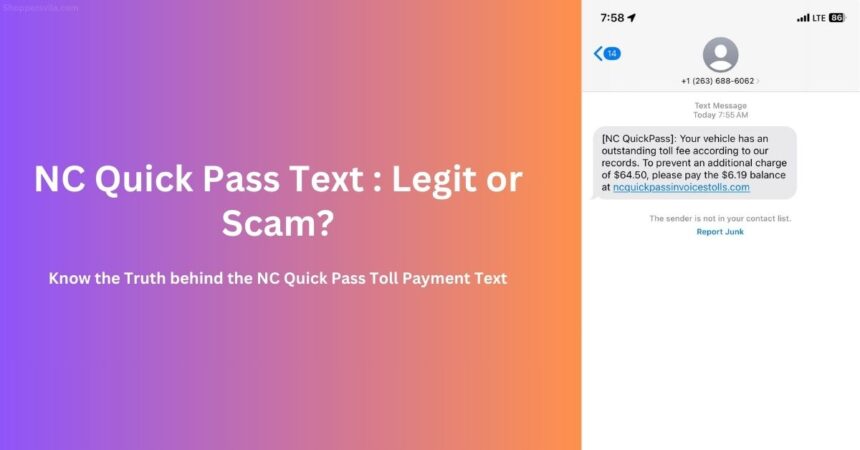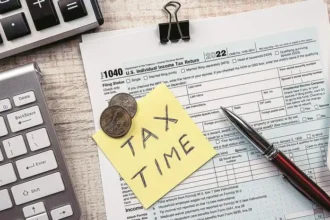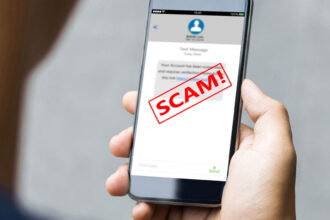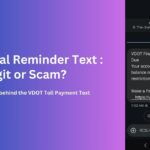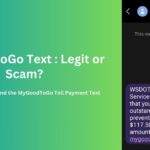A sophisticated text message scam impersonating North Carolina’s toll collection system has targeted thousands of residents and out-of-state drivers, prompting warnings from state authorities. The widespread fraud scheme attempts to trick recipients into paying fake toll fees through unofficial websites, potentially exposing victims to identity theft and financial fraud.
The North Carolina Turnpike Authority (NCTA) has reported an unprecedented surge in these fraudulent messages, with tens of thousands of concerned citizens contacting their offices for verification. Here’s what you need to know about the scam, how to identify it, and what steps to take if you’ve been targeted.
How the NC Quick Pass Scam Works
The scam begins with an unsolicited text message claiming the recipient has an unpaid toll fee from using North Carolina highways. These messages create a false sense of urgency by threatening additional charges—typically around $64.50—if the supposed debt (usually under $10) isn’t paid immediately.
The text includes a link to a convincing but fraudulent website designed to mimic the official NC Quick Pass portal. The fake sites often have URLs that incorporate variations of “ncquickpass” combined with words like “invoices,” “tolls,” or “payment” to appear legitimate.
One Reddit user described receiving a message stating:
[NC QuickPass]: Your vehicle has an outstanding toll fee according to our records. To prevent an additional charge of $64.50, please pay the $6.19 balance at ncquickpassinvoicestolls.com
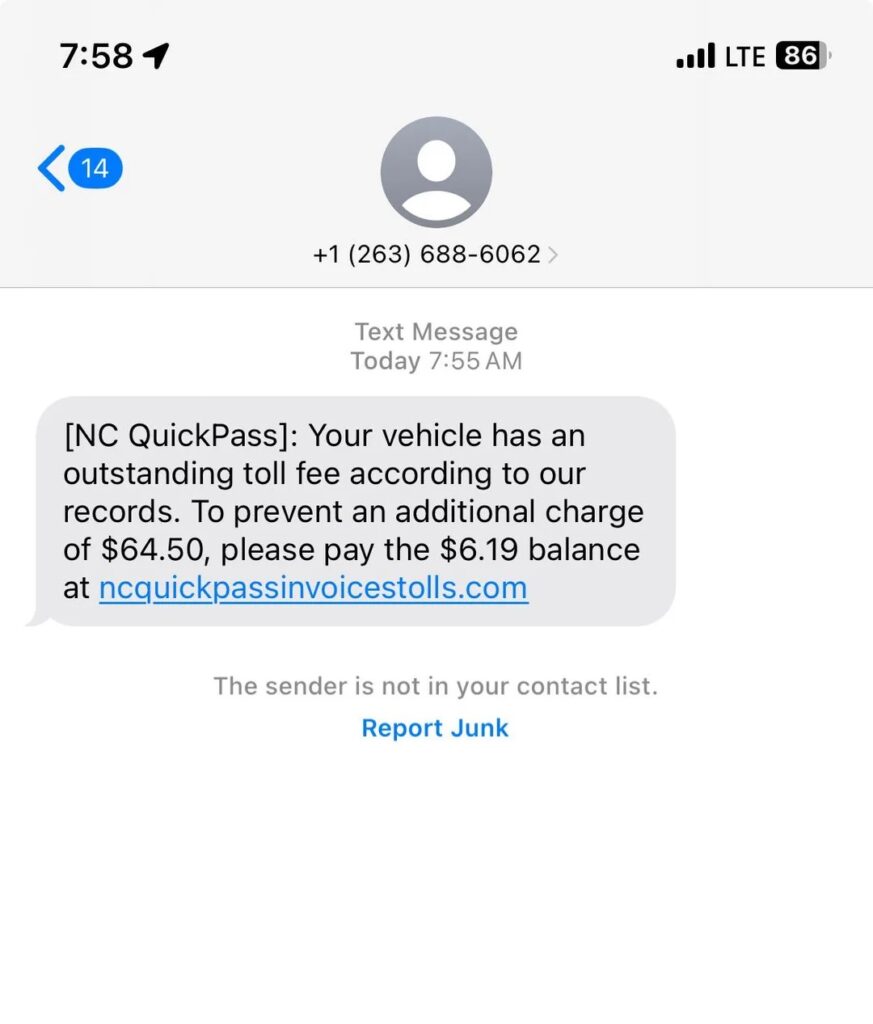
Once on the fake website, victims are prompted to enter personal information including:
- Credit card details
- Home address
- Driver’s license information
- Vehicle registration data
This information is then harvested by scammers for identity theft, unauthorized charges, or sale on dark web marketplaces.
Why the Scam Is So Effective
The NC Quick Pass text scam has proven particularly effective for several reasons:
- Geographical reach: The scammers target both North Carolina residents and people who have never visited the state, casting a wide net.
- Plausible scenario: Most drivers have encountered toll roads and recognize that automated systems sometimes bill drivers after the fact.
- Modest payment amounts: The initial requested payment is usually small (under $10), which makes victims less suspicious than they would be of larger demands.
- Fear of escalating penalties: The threat of a significant late fee creates urgency that bypasses critical thinking.
- Professional presentation: The fraudulent websites often look convincingly similar to official government portals, complete with official-looking logos and language.
According to the NCTA, domain registration data for many of these scam websites showed they were often created just days before the text campaign launched, allowing them to stay ahead of security alerts.
Red Flags That Identify the Scam
The NCTA has identified several key indicators that can help recipients determine if a message is fraudulent:
1. Contact Method and Origin
- Canadian phone numbers: Many of the scam texts originate from Canadian area codes, particularly the 263 prefix
- Full phone numbers: Legitimate NC Quick Pass texts come from short codes, not full 10-digit phone numbers
- Unsolicited contact: NC Quick Pass does not proactively text customers about outstanding balances
2. Payment Request Methods
- Payment solicitation via text: The NCTA never requests payment through text messages
- Urgent deadlines: Legitimate toll notices allow reasonable time for payment without immediate threats
- Suspicious payment methods: Some scam variants request payment through gift cards or cryptocurrency
3. Website and Link Characteristics
- Unofficial domains: Legitimate NC Quick Pass communications only use ncquickpass.com or secure.ncquickpass.com
- Recently registered domains: Many scam websites were registered within days of the text campaign
- Missing security features: Legitimate sites have proper SSL certificates and security measures
One Reddit commenter noted: “The website looks so legit it’s scary. The scammers are getting creatively good I fear.“
What To Do If You Receive a Suspicious NC Quick Pass Text
If you receive a text claiming to be from NC Quick Pass, follow these steps:
Immediate Steps:
- Don’t click the link in the message
- Don’t reply to the message
- Screenshot the message for documentation
- Block and report the number as spam through your messaging app
- Delete the message to prevent accidental clicks
Verification Steps:
- Check your account directly by visiting the official NC Quick Pass website (ncquickpass.com)
- Call NC Quick Pass customer service at their official number (877-769-7277)
- Verify any legitimate tolls should be sent via postal mail to your registered address
A Reddit user shared their experience: “I was suspicious and called NC Quick Pass & she checked my name & license plate & there was no outstanding balance.“
How to Protect Yourself from Toll-Related Scams
Taking proactive measures can help protect yourself from this and similar scams:
General Protection Measures:
- Register for an official NC Quick Pass account if you frequently travel on North Carolina toll roads
- Update your address with the DMV to ensure legitimate notices reach you
- Check your account periodically through the official website
- Save the official NC Quick Pass phone number in your contacts for quick verification
Digital Safety Practices:
- Never click links in unsolicited texts or emails about toll payments
- Bookmark the official websites for toll systems in states you travel through
- Use credit cards with fraud protection rather than debit cards for online payments
- Enable two-factor authentication on your accounts where possible
- Consider using a credit monitoring service if you travel frequently
What To Do If You’ve Already Fallen Victim of NC QuickPass Text Scam?
If you’ve already clicked a link or provided information to a suspected NC Quick Pass scam site, take these steps immediately:
Financial Protection Steps:
- Contact your bank or credit card company to freeze or cancel any compromised cards
- Place a fraud alert with the major credit bureaus (Experian, TransUnion, Equifax)
- Monitor your accounts closely for unauthorized transactions
- Change passwords for any financial accounts you may have accessed after visiting the scam site
Reporting the Scam:
- File a report with the FBI’s Internet Crime Complaint Center at IC3.gov
- Report the scam to the Federal Trade Commission at ReportFraud.ftc.gov
- Notify the North Carolina Attorney General’s Office through their consumer protection division
- Contact the North Carolina Turnpike Authority to report the scam
One Reddit user who fell victim shared: “Well my dumb self clicked and paid. I froze my card. What should I do now?” Others advised the victim to monitor their credit reports and file reports with authorities.
How Legitimate Toll Violations Are Actually Handled
Understanding how legitimate toll violations are processed can help you identify scams:
- Official notification by mail: Legitimate toll violations are sent via postal mail to the address associated with your vehicle registration
- Photo evidence: Official notices include photos of your vehicle and license plate
- Multiple payment options: Legitimate notices offer various payment methods, not just online credit card payments
- Appeal process: Real violations include information about how to dispute the charge
- Reasonable timeframes: Official notices give adequate time to respond before penalties
The NCTA emphasizes that NC Quick Pass will never send text messages requesting payment for tolls. All legitimate communications about unpaid tolls come through official channels, primarily postal mail.
The Broader “Smishing” Trend
The NC Quick Pass scam is part of a growing trend of SMS phishing (or “smishing”) attacks targeting consumers nationwide. Similar scams have been documented impersonating toll systems in Florida, Texas, Illinois, and other states with major toll roads.
Cybersecurity experts note that these scams often surge during holiday travel seasons when more drivers are using unfamiliar roads and may be uncertain about which toll charges are legitimate.
As one Reddit commenter noted: “Word of the Day: Smishing” — highlighting how this technique has become common enough to warrant its own terminology.
By staying vigilant and verifying any unexpected toll charges through official channels, you can protect yourself from these increasingly sophisticated attempts to steal your personal and financial information.
For more information, visit the official NC Quick Pass website at ncquickpass.com or contact their customer service center at 877-769-7277.
